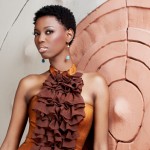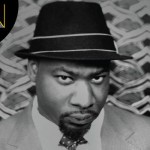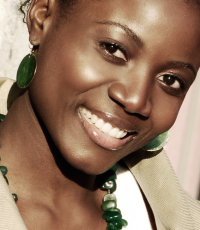If personality were a key casting attribute in the world of acting many of today’s endowed performers would be at the center stages of theaters. One can deduce that the sometimes flaky realm of theater only leaves room for the passionate to stand, because without fervor, perseverance would be left on wobbly ground. Just a short dialogue with Nigerian/American actress Ebbe Bassey, a woman with definite personality, draws one into a fun, cheery territory that seems to compliment the artistry that bore her new short film, “Siri Oko Fo,” debuted at the 2008 Cannes International Film Festival.
“Desperation,” she says, of what inspired the film. “You get tired of waiting for the phone to ring; you get tired of going in for a casting call and not getting it because maybe there’s a named person that they want.”
And possessing such distinct trait as her heritage becomes an encumbrance from time to time. “I have authentic Nigerian accent, but I still am told, ‘You don’t look African” because in their mindset, an African looks like a Sudanese, you’ve got to be really dark,” she explains.
“Now we on the other hand know that, within Ghana, within Nigeria, that in a family you can have somebody look like a Fulani, their face light all the way down and then to the darkest spectrum. But here, they paint everybody with the paint, ‘Oh you’re African.’ Uhmmn, I’m Nigerian,” she chuckles, “because it’s not a country, it’s a continent. It depends on what kind of African you’re looking for.”
Still on the subject of her creative project she injects: “So eventually, it boiled down to, ‘Well, let me do something while I’m still of course, foraging for work, I can also create opportunity not only for myself but for other people.”
Bassey’s 12-minute film has been screened at the Hollywood Black Film Festival and Boston International Film Festival with additional screenings this fall at the New Film Makers’ Film Festival and Urbanworld Film Festival.
An idea that sprung from despair and a need to expose her talent to the rest of the world appeared to have possessed potential Bassey may have overlooked in the beginning. “It’s been really, really awesome. At the Hollywood Film Festival it did great,” she says of the response to Siri Oko Fo, literally translated in her paternal language, Efik, spoken by natives of the South Eastern region of Nigeria, as “Mending Fences.”
Born in the United States to a Nigerian father and American mother, Bassey asserts that most of her values are interlaced with where she grew up – Nigeria, a place that witnessed the nascent stages of her theatrical talent.
“I’ve always known since I was a kid,” she explains her interest in acting, “Everybody else would read their story book quietly or read to themselves, I was always the one that had to read it with drama. I had to act out every character, I would picture who would be what, and then I would disturb the whole class by trying to arrange everybody so we can act out the whole book,” she reminisces with a laugh.
Despite her proclivity to identify herself as Nigerian, Bassey acknowledges her maternal heritage, one of mixed cultures including West Indian, something that has proven to professionally work in her favor.
“I went to Nigeria when I was two years old so I’m very Nigerian in my thought process. But at the same time I can drop it like it’s hot like an American,” she bursts into laughter. “I can swing both ways, when I’m with Americans, with my mom’s family, you couldn’t tell I grew up in Nigeria.
“I don’t give my dad anything with one hand, I don’t look my dad directly in the eye when he talks to me even at my age,” she elaborates on her Nigerian values. “But I can flow, which I think helps me a lot in my career. If they need an African, I’ve got it, if they want Brooklyn ‘How you doing girl’ I got that too,” she laughs as she switches from a Brooklyn accent to West Indian, “And if they want me to go a little Jamaican I can do it ya know my mother from the West Indies.”
Bassey experienced her first huge break in 2003 on NYPD Blue, the Emmy Award-winning police drama staged in New York City. The excitement from five years ago still lingers as she recounts activities surrounding the call to audition.
“And guess what I was doing? I ran somebody over with my bus! My whole line was, ‘I didn’t see him, I swear,’ she laughs, “But I was so excited, you can’t believe how excited I was. I went to tell the whole world, ‘I got two lines!’”
Since then, Bassey has featured in three episodes of Law & Order SVU, with her first appearance in 2004, an experience she asserts was beyond her wildest imagination. “I cannot wait to be on the show on a regular basis like every week,” she says with what sounds like a wishful laugh, “I mean that would be my biggest dream. And that’s the aim; I’m not really looking to do film as much as I’m looking to do steady theater.”
But even with luminous lights permeating the lenses of her career, she admits it is a difficult industry. “It’s a challenge for Sanaa Lathan, it’s a challenge for Gabrielle Union, it’s a challenge for all of us. Having roles that are juicy, that’s not your regular cookie cutter what is perceived as black women. It’s hard finding those kinds of roles,” her tone drops as she shares some impediments in the industry.
“I don’t want to be seen just as a Nigerian actress because my emotions in movies and in situations [are] not Nigerian,” Bassey elaborates. “Crying for your mother who died is the same for everyone. The way a Chinese woman cries for her mother who died is the same way a Nigerian cries, it’s the same way an African-American cries. So when writing these movies, the situation is not something nobody else can experience. Emotions are human, situations are applicable to everyone. The challenge is finding roles that just allow you to expand yourself, to improve upon your skill, to challenge you.”
But she flips the disconsolate page to a cheerful one when she says: “I know that there’s someone that’s going to be reading this and thinking of being an actor or not just being in the creative field but is thinking that, ‘I’d love to open a business, I would love to write a book, I would love to start a school.’ Sometimes fear holds people back from achieving the dreams that they have in mind,” she recounts her own journey 10 years ago.
“Anybody that comes to you with a negative and try to say they’re playing devil’s advocate, tell them to take their devil’s advocate and put it where the light don’t shine. Do listen to your spirit because God has given every one of us a purpose and if inside of you, for as long as you’ve known yourself, you feel like this is something you should be doing, whether it’s opening a restaurant or writing a book, one small step at a time,” she adds.
“Do what you have to do to make your dream come true. If it works out, yes, yes, to God be all the glory. If it doesn’t work out, at least you can proudly say, ‘I took a bold step to make something happen for my life, to positively contribute to this world. It didn’t work out but you know what, at least now I know what I can do and what I can’t,’” Bassey encourages.
The socially conscious actress asserts her affinity for self-awareness stems from her upbringing with heavy influence by her spiritual grandmother.
“I can’t do anything without prayer,” she states. “I can’t do anything without God because if it were not for God I wouldn’t be here, right? I’m very grounded in my spirituality; if I lose God, I’ve lost it all.
“For me, my prayer has always been, never ever to start worshipping getting the Oscar, to start worshipping getting money, to start worshipping being famous. I never replace God with anything in my life. As I go up in the business, I want to grow stronger in my faith.”







